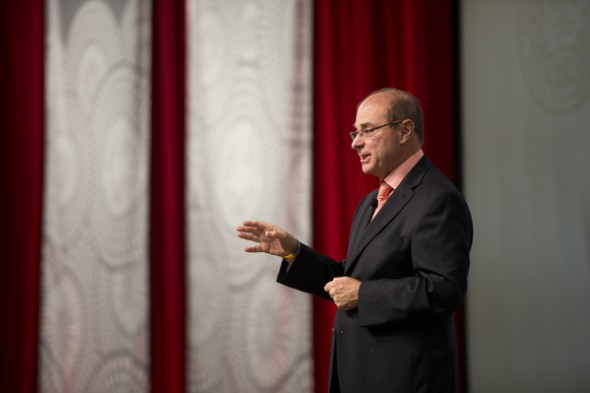Aoun provides guidance on proposed college rating system

Northeastern President Joseph E. Aoun recently offered guidance to the U.S. Department of Education as it develops a new higher education evaluation system. Photo by Brooks Canaday.
As the federal government refines its plans for a new higher education evaluation system, Northeastern President Joseph E. Aoun offered his guidance in a letter to the U.S. Department of Education on how to make the ranking system beneficial for colleges, students, and families.
In the letter, addressed to Education Secretary Arne Duncan, Aoun encouraged the Department of Education to consider the work colleges and universities are doing to prepare students for long-term career success and include in the ranking metrics such as the percentage of alumni employed or enrolled in an advance degree program six months after graduation.
“If we are to help students and families distinguish value and reduce college costs, we need to provide students with information not only about whether they can afford to attend an institution, but also how likely they are—once enrolled—to complete their degree and secure postgraduate employment,” Aoun wrote.
President Barack Obama’s proposed Postsecondary Institution Rating System, which could be in place by the 2015–16 academic year, aims to assess higher education institutions’ value. And pending Congress’ approval, future federal aid could be tied to how colleges and universities perform in the rankings.
Northeastern strives to be a leader in preparing students for success after college through its experiential learning model and specifically cooperative education. Through co-op, students alternate between classroom work and real-world work experience. This allows students to gain significant experience that hiring employers seek in candidates.
Aoun noted, in his letter, Northeastern’s commitment to working with the federal government to make college more accessible to students, while promoting innovation and improving higher education outcomes. He added that Northeastern extensively surveys its alumni on career outcomes and uses those results to determine best practices for providing career-aligned experiential learning opportunities to students.
In fact, 90 percent of Northeastern graduates are employed full time or enrolled in graduate school within nine months of graduation. More importantly, 87 percent of 2012 graduates who are employed full time are doing work related to their major. And underscoring the value of experiential learning opportunities before graduation, 51 percent of 2012 graduates received a job offer from a previous co-op employer.
Aoun’s suggestions were highlighted in a recent Inside Higher Ed article detailing various higher education leaders’ opinions on the proposed new ranking system.
Aoun’s letter underscores his leadership on addressing higher education’s most critical issues. He recently completed a one-year term as board chair of the American Council on Education, and currently serves on an academic advisory council that examines how universities can contribute to America’s national security efforts.
In January, he attended a higher education summit at the White House that focused on making college more accessible and affordable for economically disadvantaged students. At the summit, Aoun announced new plans by Northeastern to help economically disadvantaged and first generation students graduate, including new full-tuition scholarships and a new financial literacy education program.
As an institution, Northeastern has made great strides to enhance higher education access and the success of students. This year Northeastern is investing $204 million in institutional grant aid. It’s the largest investment in the university’s history and this is the sixth straight year Northeastern has increased financial aid at double the rate of tuition and fees.
In his letter, Aoun cautioned against a rating system in which performance is pared down to a single overall grade because it would make “several critical value metrics meaningless.”
“Above all,” he added, “the Department’s ratings should take into consideration the specific mission of the many different types of institutions serving traditional and non-traditional students in order to reflect and make meaningful the broad diversity of the various sectors.”




